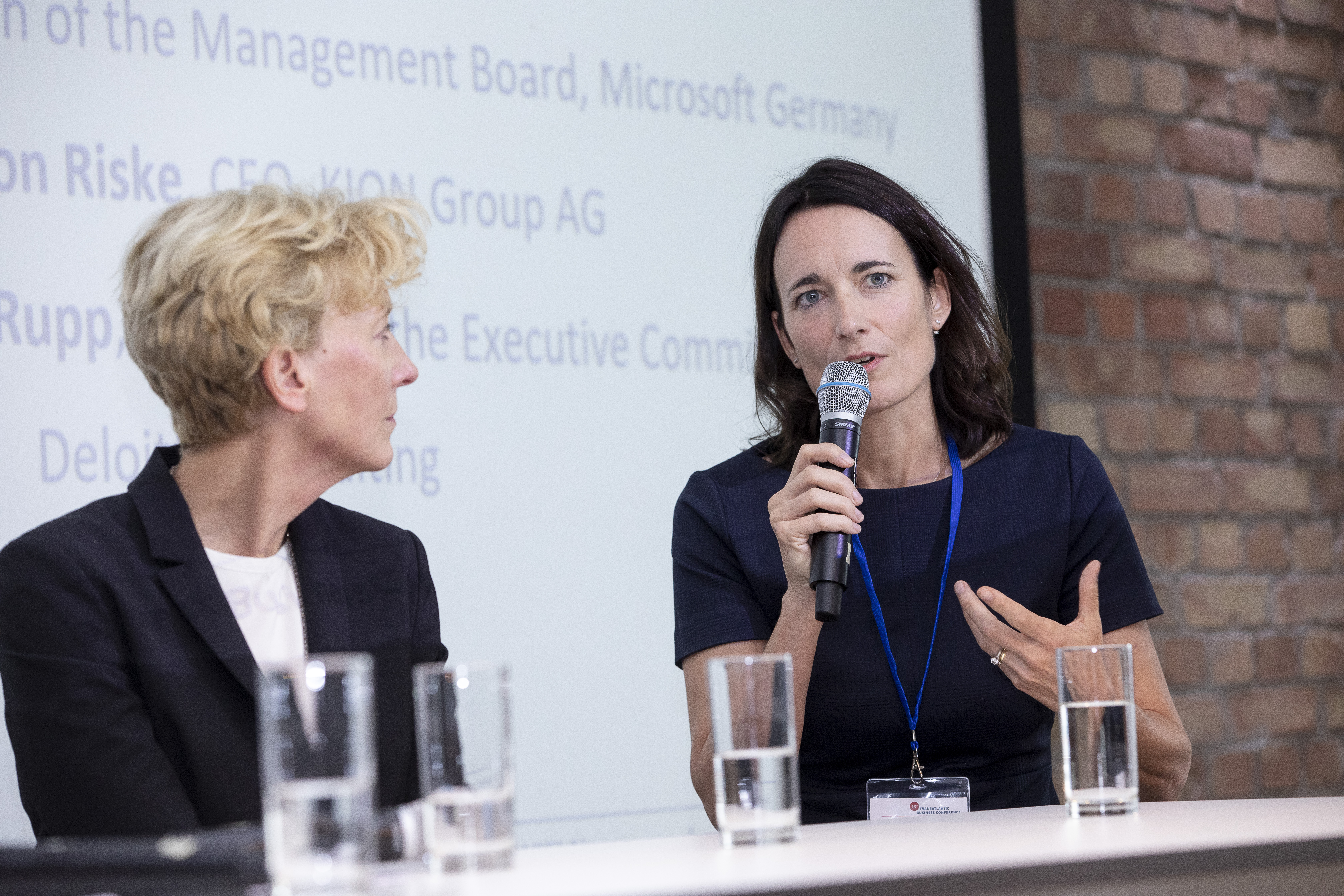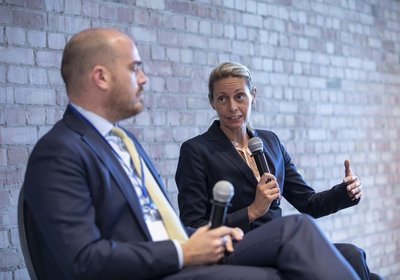"It has been 30 years since the wall that divided this city came down. But tonight, there are new physical and metaphorical walls going up all around the world. And like 30 years ago, we need every citizen of the free world to help tear them down." It was with these words that Eric Holder, former US Attorney General, opened the Transatlantic Business Conference. In the week of the fall of the Berlin Wall, Holder appealed to everyone to stand up against walls and divisions and underscored how the transatlantic partnership serves as the foundation for peace and prosperity.
The relationship between Germany and the US is global
Frank Sportolari, President of AmCham Germany, took the transatlantic partnership - which he called "the issue at stake" - to a new level: "We're no longer dealing with a transatlantic issue – the relationship between Germany and the US is global." Sportolari further considered the achievements of the transatlantic partnership and mentioned its importance by reaching out to people who might not be aware of its significance. It is therefore essential that business representatives, politicians and academics from the US, Europe and Germany engage in continuous dialogue to shape transatlantic relations and counter increasing fragmentation.
In this context, Dieter Kempf, President of the Federation for German Industries (BDI), warned against protectionist measures: "The history of the 20th century has repeatedly shown: Trade conflicts are expensive. It permanently damages the global economy if such trade negotiations are conducted as if they were a game of poker. For that, the economic consequences are too serious," Kempf stated. On the contrary, one must remain in dialogue: "It is hard to understand why the US administration imposes tariffs instead of seizing the opportunity to sit at one table and find solutions together."
Uncertainty is hindering success
Thomas Bareiß, Parliamentary State Secretary at the Federal Ministry of Economics and Energy, underlined Kempf's statement: "In order to remain competitive in the future, we must work together and not against each other. Our companies on both sides of the Atlantic and our closely interwoven trade and investment relations are proof of the success of our partnership, and organizations like AmCham Germany play a crucial role in continuing to work together and finding common solutions."
Gordon Riske, Managing Director of the KION Group, outlined the advantages of competition and at the same time bemoaned uncertainty. As an example, he mentioned the Industrial Revolution, which saw European countries thriving partly due to trade. Germany was left behind during this time due to its borders and tariffs in the German states, and the country only succeeded, Riske said, after the customs union was in place, which put Germany at the forefront of trade.
The uncertainty in the German-American partnership has left its mark on companies and their competitiveness. Riske made clear how much this could harm the economy: "Uncertainty prevents success at a time when we can least afford it," he warned. Ralf Brinkmann, President and Chairman of the Board, Dow Germany, underlined that continued dialogue, even if agreement might seem unlikely at times, was of utmost importance. Companies and politicians should therefore focus on global cooperation: "People are curious by nature and act globally. That's why our customers expect us to do the same."
Curiosity, education and global thinking to stay competitive
This approach was also shared by Annette Green, Vice President DACH of the SAS Institute. She proposed three concrete solutions to strengthen competitiveness in the 21st century: Curiosity and openness towards artificial intelligence, education about new technologies and global thinking. "Competition for leadership in artificial intelligence is not a competition between nations, but a healthy competition between businesses to make sure that they provide the best products," said Green.
The panel on Internet of Things and platform economy with Sabine Bendiek of Microsoft, Christine Marleen Rupp of Deloitte, and Gordon Riske of KION focused both on technological change and on the necessity to think globally. The changes caused by new technologies require global thinking, emphasized Bendiek. She believes that national champions were a phantom and "one cannot serve customers all over the world from a closed garden." In order not to lose the connection in the development of new technologies, Germany should appear more determined, Rupp noted. Especially in the fields of education, infrastructure and regulation, Germany should have more courage, she stated. "5G is the highway for the digital revolution. I would like us to take a more courageous approach to the development of this infrastructure." As there were many companies and successful platform players in Europe, one should not ask the “either/or” question when comparing Europe and the US. This approach was also shared by Sabine Bendiek: "As a common ecosystem, we create more value, which we can then better share with each other, than when we create parallel systems alongside each other."
China and the US – and the relationship's impact on Europe
The discussion on the Chinese-American trade dispute focused on its impact on Europe. Thomas Hueck, Chief Economist at Robert Bosch, explained how the frictions between the US and China damage companies and create uncertainty, but also made clear that investment decisions depend on long-term forecasts. Mung Chiang, Dean of Purdue University College of Engineering, argued for cooperation while maintaining vigilance in dealing with China: "Openness is important, but always requires in-depth scrutiny." He believes that it is less about which country we are against; it's about what principles we are in favor of. As long as there is humility and respect on both sides of the ocean, then this human bridge will prevail, Chiang closes.
In his closing speech, the former Foreign Minister and Vice Chancellor Joschka Fischer called on the audience to take China seriously, but stick to our values. "The transatlantic partnership as we know it will not come back. Not even after the next election. Nevertheless: Americans and Europeans belong to the same family. We are dependent on each other," Fischer said, concluding: "There is no positive future without the partnership between Europe and America."
Watch our event film here.


